
— Sketches by NIKOS STAVROULAKIS
I replied that I had not. I took it from him and proceeded to open it to a fourth page column titled Greek News in Brief.
There, one may read about brothers biting off one another’s ears in what the paper always calls ‘agrarian disputes’, or about eighty-year-old men beating their wives to death in fits of jealousy, or mothers throwing their babies from balconies. I was just beginning to read about a young girl who saw a ‘killer cockroach’ and broke her leg trying to leap onto a chair to escape it, when the police chief ventured to call my attention to the front page. So I closed the paper and focused on page one where, as I already knew, the lead article was devoted to some recent prohibitions announced by the colonels.
The island of Hydra had once had a decent Chief of Police, best known locally for his minor role in the film Boy on a Dolphin. He had been replaced after the coup by a severe and nervous fellow. I suspect Greece mass-produced these replacements during the period, for they all looked extremely unstable and walked like hemorrhoidal rear-admirals. He stared at me as I looked up — he had just removed a fleck of dust from his uniform — but I quickly turned my eyes back to the newspaper so as to postpone the showdown.
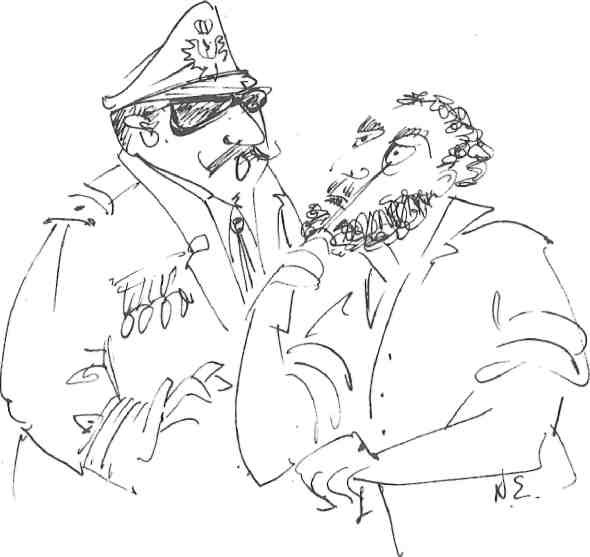
A post-coup pattern had emerged on Hydra: all of the wealthy foreigners learned to behave as though nothing had happened, while those on the opposite side of the financial spectrum were deported, usually on orders from the local police. One day a suspected informer had approached a harmless fraulein and enigmatically whispered ‘Trieste’ in her ear. When he saw her confusion he said, ‘Trieste, that’s where you will be by tomorrow evening, ha-ha!’
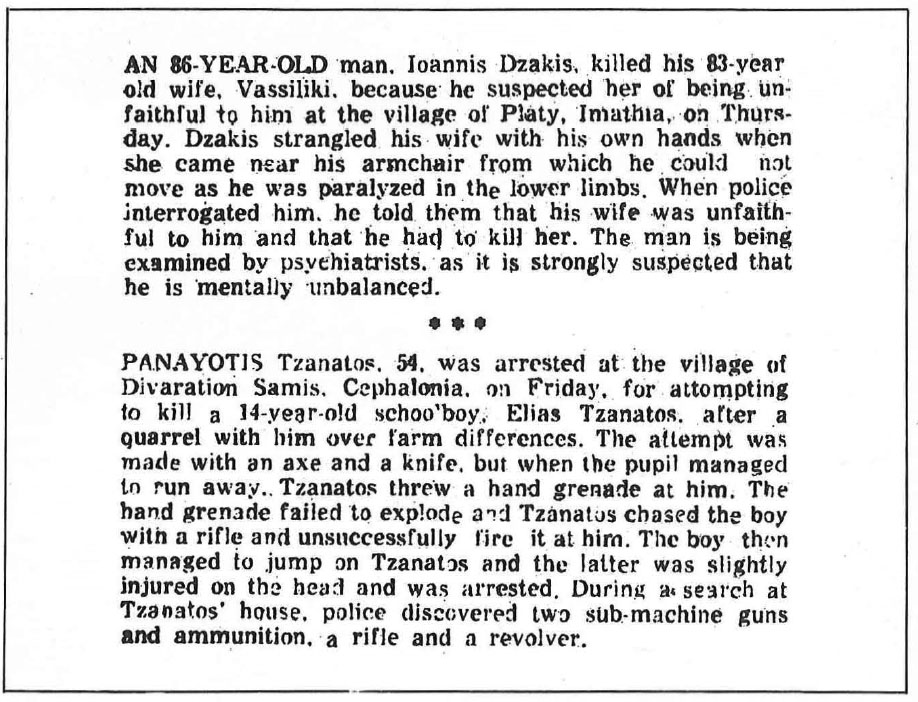
I put The Athens News down on the desk and looked at the Chief of Police. The buttons on his uniform sparkled in the sun slanting down from a window above. He stood up behind his barren desk and his creases snapped rigidly into place. So meticulous on such a low salary, I thought. He was about to make a statement; characteristically, on such occasions, his face turned blank and his knuckles white.
Along with outlawing mini-skirts, meagre funds, bare feet, and long hair, the colonels had decided that only priests might wear beards. I was now informed that I would have to have mine shorn off to conform with the law or face expulsion from the country. The room was very still; only goat-bells could be heard in the distant hills. Ί am very sorry,’ I said, Ί cannot do it.’ He eyed me sternly and replied, ‘Then you must leave the country. At once.’
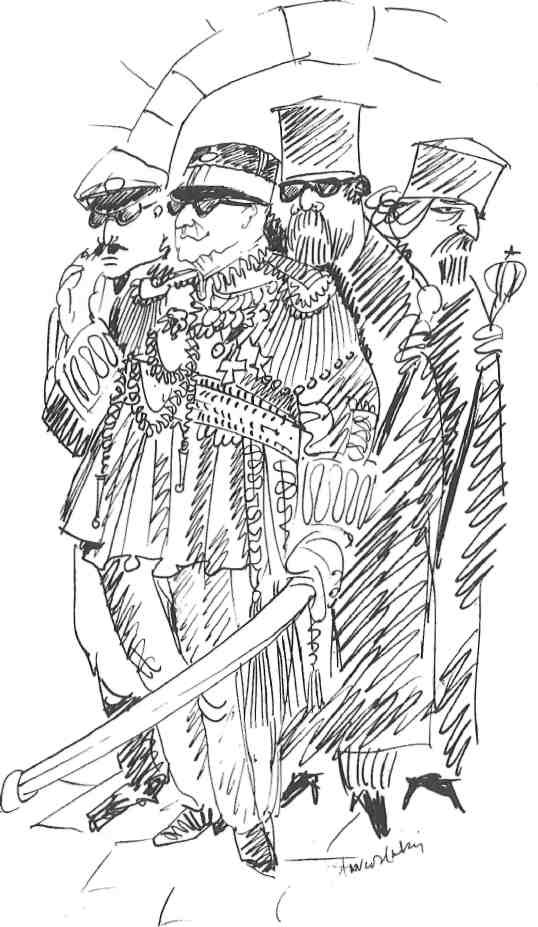
That did it! I grabbed a pen from my pocket and jabbed the air in front of his seemingly heartless chest. Who in the hell was he, I demanded to know, Peter the Great? — of Russia, I added, lest he be confused. I wore my beard, I told him, as part of a vow. Did he understand what a vow was? Were the priests going to shave off their beards and unknot their hair? I was shouting by now, determined at least to enjoy the minimal satisfaction of outrage at my first deportation ceremony. I fired questions at him: about Ghandi, Churchill, Adolph Hitler, and John Kennedy.
He was little prepared for what I was to do next. I wear a life-like false eye which is plastic and virtually indestructible. I took the pen and struck the eye rapidly. Click-clack. The sound was identical to a collision of billiard balls. Consternation spilled over his face as I drew down the lower lid of my good eye (in Greece this expresses dubiousness) and told him he must remove this one before I would do anything he demanded of me. Period. I rested while waiting for the guards.
When he spoke one word burst out in the room like shrapnel. It was entaxi, a word usually implying ‘alright’, in a final sense. I was stunned by his loss of control, but I shot back.
Entaxi what? Entaxi I go? Entaxi I leave the island? — or the country?’
En taxi-en taxi, ‘he said lividly. ‘You must stay.’
Even that sounded like an order. He had turned away, refusing to look at me. So I walked out of his office feeling free of anger and agreeably ridiculous.
I had been in Athens on April 21, 1967. Time and again the analogy would come to mind: they were like bulls running in the streets. Frightened bystanders had vaulted the barricades below me. From the hotel balcony I watched an altercation resume and the police flail out with their polished clubs, their shiny shoes cracking on the street like bullet shots. It was senseless, it was meaningless. I had the flickering impression that closing the shutters of the balcony doors and returning to bed would make it all disappear. It reminded me of grey cinema-footage seen twenty years before of nervous, excited bulls pounding through the streets and alleys of Pamplona. It was more stupid sport. I watched.
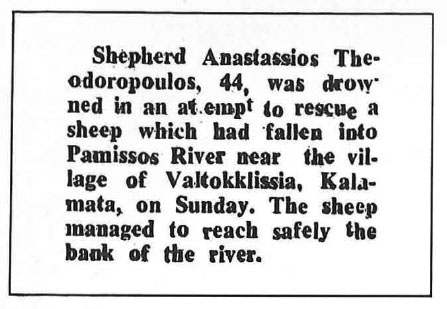
The man came to a whirling halt. The police had caught him so tightly that the threads of his jacket disintegrated raggedly in every direction. The four in black uniforms, the peace officers, shouted at him and jostled him until one grabbed the man’s cravat and hoisted him up with strangling jerks punctuated with threatening abuse. Now he rammed his silky head against his captive’s mouth and simultaneously released his cravat so that he might collapse to receive a lustrous block kick in the head.
A figure darted into the crowd. It moved faster and faster with the panic of indecision, then slipped through the barricade, sprinting toward the injured comrade. He did not see the soldier running towards him at equal speed, rifle extended like the cattle guard of a locomotive. He crumpled from the impact, leaving blood and part of his scalp on the bolt and sights of the soldier’s oily rifle. There were two wounded in the street and the authorities sought more.
A loudspeaker crackled as the soldier sauntered back up the street, tossing off insults from the laughing pallikaria who lounged at the side of a formidable American-built tank. All streets leading into the circle of Omonia Square were decorated with tanks. ‘Harmony Square’ was a temporary community of green beings. The markings of the species determined what was being done. Some were commanding, some communicating beneath gyrating antennae, some sitting blankly in trucks, some standing in geometric formations looking chilly or blandly bellicose. On the pavement beneath my balcony puddles of blood were reaching towards each other.
I slammed the shutters together and diagonal stripes of dusty light sliced across the room. After much banging on the telephone, I got through to room service which promised to have a drink sent up, possibly with ice. I was fairly sure what was up as I turned on the radio and spun the dial to the American Armed Forces station. Sleazy violins played old favourites and would continue to do so for hours.

Suddenly an adolescent voice broke over the radio. It was nervous and the speech was strung together with stutters. It was ‘good old Airman Joe Smith’: We have been asked to make this announcement. Due to an… eternal disorder the Greek government has declared an actual emergency… er, national emergency. A curfew will be enforced at sunset. All military personnel and dependents are asked to be off the streets by sundown. Those who fail to obey this will be shot in the street without further notice. Thank you.
A sheepish man finally arrived with the drink, and I continued to listen to the bungling Joe Smith explain that an Officers’ Wives’ Bowling Tournament had been canceled, and that the Boy Scout trip, Troop Number Ten, to Delphi, had suffered an indefinite postponement. Then he stumbled into the curfew-shoot-them-in-the-street business again, and I thought, ‘Well,… maybe he means feet’.
I turned to the Greek radio broadcasts where any rubbish was being played as long as it included drums, bugles, or clarion calls. Fascist fanfares, Valhallic waltzes, Napoleonic marches, Prussian tangoes. It was as if some mad Teutonic Kommandant was playing disc jockey to the human race. I could visualize him in the control room with his handlebar moustache, bleary eyes, and plumed helmet, chuckling to himself and thinking, Ja, this will drive them mad. A chill shot from my scotch on the rocks right up my arm and into the marrow of my spine.
After much fiddling with the dial, I thought I had found a sensible song and locked it at the spot only to cock my ear at the diabolical boom of cannon. I took the radio out to the balcony and set it on the ledge. Blaring full blast, it flooded the street below with the salvoes of the 1812 Overture. At the next unexpected orchestral detonation, heads jerked upwards from below, then with explosion following explosion melding with a loud carillon of bells, the crescendo produced a flicker of soldierly smiles. I turned the radio down low, for now over the air came a chorus of screaming demagogues.

The ping of distant shots echoed over the city on this blustery, truculent day. The tedious men in black and green controlled the streets and allowed neither questions, nor answers, nor assembling. They blared their fine military music to the heavens and enshrined their glorious military laws on the walls. People mouthed the ordained tunes, but none could be fooled. This military music, they all knew, was to music as military law was to law. I decided to inspect the Plaka.
The streets were muted. The prudent stood in lines to buy bread and stale salami, then stole home. Consistent with my political innocence, I found myself dressed in a bright red pullover. Padding down Voukourestiou — one of the busiest and narrowest streets — I was stopped cold by the flash of a bright smile. The passing form of a young and well-dressed man spoke in a very audible and arresting voice, ‘Viva la Hberdad’ He nonchalantly continued down the street where I imagined cops and quislings were thick as fleas, and silent gloom hung like leaden fog.
I met a shop owner I knew and took him aside for a grilling. He rose to the smell of drama like fish after bait. ‘This is the one day Greeks do not talk politics,’ he said, looking over my shoulder down the alleys of the Plaka. I visited a coffee shop to eavesdrop and there, too, I heard nothing but the ring of my own thoughts and the echo of an army melody. Athens was as quiet as a cistern, with just the lonely drop falling in rippling time.
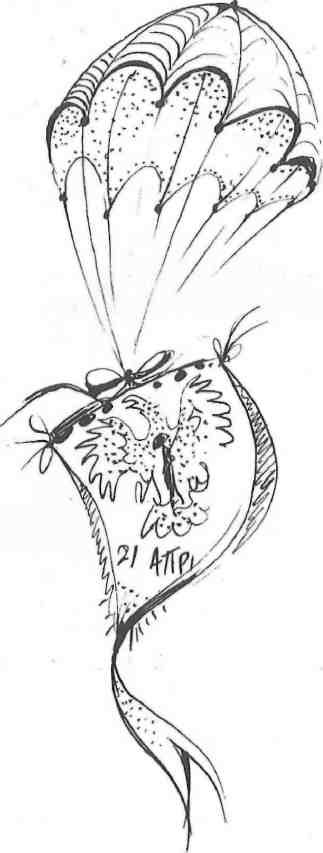
I was twenty-six and full of impulse. I walked up the hill to a friend’s house, hoping to be informed of what was going”· on. The room was a decaying fortress; walls of ancient, worn books sheltered us from the outside — or at least gave that illusion. He was ill with flu and wore a dressing gown, but he gave me a drink and then he spoke — sadly reaffirming my fears. ‘It’s a coup, a new dictatorship. There will be much bloodshed ahead.’
That night at my hotel I ventured from the room to the balcony. A stupid symphony of bullets had begun its prelude, reverberating between the stony crag of Lycabettus and the weary Acropolis. Increasingly I heard ricochets around the corner or the single bullet blistering the air overhead. I watched the ritual in the street with morbid enthusiasm.
Suddenly a soldier aimed his rifle at me, his comrades motioning me inside. I resented this. It was not time for the curfew. I played hide-and-peeks for half an hour and rifles were raised each time I tried to steal a glance. Gradually I tired of being a target and went inside, locking the shutters and closing the glass doors. Later, when gunfire sounded close enough to rattle the ice in my drink, I sealed the windows with a double mattress pinned upright by a large armoire.
Now I was wary. What reason did I have to presume they wouldn’t come to our rooms and shoot us? None. I decided I had to observe closely, so I went up onto the roof and crouched there painfully for about an hour. As the sun went down the gunfire increased. It was not the fire of conflict, but that of a planned intimidation. There was no resistance — they were putting a hot-lead lid on Athens. From my location in Omonia, it sounded like the opening bars of the Battle of Stalingrad. Who would dare step outside?
Raising my head to scan the streets below, I found twenty surprised cops staring me in the face — they were in a glass-walled office building across the way. When I saw the first pistol holster flap open, I disappeared and went below.
One morning back in Hydra, when my hangover told me to check the obituary columns in case I had passed away the night before, I ambled down to the harbor on the usual errands, for bread, for breakfast, for conversation. It was a bright, warm day. Athenians swarmed raucously about the coffee shops, moving through the forest of tables and canvas chairs with all the delicacy of army ants. Every edible thing on the island appeared to have been consumed by this garish holiday crowd; still, its appetite had not been satiated.
Blue and orange and white tarpaulins were being drawn overhead to protect the tourists from the tortures of the sun. At the more proper restaurants and tavernas along the quay, one could expect to see at least one fully laid, white-linened table rise into the air, snagged on a fouled line connected to a tarpaulin. (I once saw a terrified child rise fifteen feet into the air clinging to such a rope.) Whenever a table rose inevitably into the air, the several men required to spread one of the massive tentes would invariably cringe at the sound of shattering glass and clattering silver; and as the levitating table smashed to the cobbled ground, great bellowing guffaws would erupt from the boisterous mob.
I was sucking up a granita, a sherbet-like ice, when a huge rush of descending sound engulfed me in rising decibels. It left a faint smell of gasoline in the air. Within a second a fragile, sandy-yellow biplane pulsed over the diminutive Hydra harbor. Everyone was mesmerized by this ludicrous contraption of the past, and sat mute, rapt, until the reverberating drone of another approached. We rose as one, and moved away from the tarpaulins so as to see the sky. Presently the second biplane appeared skimming along at an altitude equal to the bell tower of the church. As it swept over us, its goggled pilot frantically shoved handfuls of paper out of the cockpit. He seemed oblivious to the proximity of the tower, and from where I stood it looked breathtakingly close. The paper fluttered down like coins underwater, reaching the hands of the curious. They read the message sent from above: Long Live the Revolution!
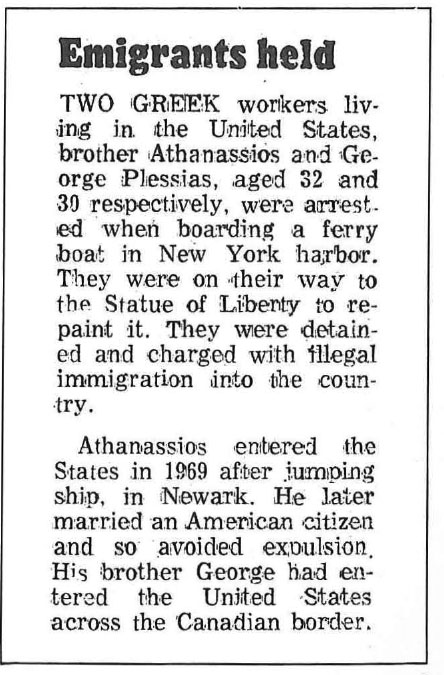
By the time a fourth smoke-belching canvas aircraft passed over the town, the crowd was as indifferent to it as it was to the freshly printed refuse blowing about — even when the engine faltered, missed a beat, and backfired twice. The pilot waved with foolish delight.
Both sides of the harbour have been flanked with fortifications since the Turkish dogdays and, concurrent with patriotic events, tired old cannon concussed the harbour village with blunt booms. The peal of madly-rung discordant bells vied with the blast of cannon, as is the custom, but on this day there was the additional criss-crossing throb of biplanes. I was impressed with the great noise and thought it as elemental to the Mediterranean world as silence is to the Oriental.
The excuse for the festivity was the naval hero of the War of Independence, Admiral Miaoulis. Andreas Miaoulis and his walrus moustache, manufactured from white, snowy marble, presides over one end of the harbour. A lion of the same material lounges protectively at the foot of his statue, his tail cracked or snapped off at the apogee of what had once been a rather graceful arc. It is around this local monument that the impeccably indolent pass their time and take their coffee. The Chief of Police sat there, as did the mayor and the doctor. And when eventually the new dictator came, he sat there, too.
On this day the citizens had been. cordoned off neatly to form small square areas in front of the marble cathedral. Near the statue a black and white block of sailors stood, looking for all the world like a colony of penguins clutching marching-band instruments. I moved closer to investigate, and sidled up to a friend I recognized, Tasso. (On such days I have always thought of a Van Gogh painting I have never seen, Tasso in the Madhouse, and wondered if it looked like him.)
Suddenly, ten men in dark suits burst out of the gateway of the cathedral and hurried to the quayside, one tripping over a heavy mooring ring. They began mysteriously boarding a waiting boat. The tassels on its canopy dipped and waved as each man boarded. When all were safely on, the boat pushed off and made an urgent circle twenty feet from the quay. The ten men unpacked their gear and adjusted their cameras. The boatman positioned his little craft to afford them a good shot of the cathedral gates, but as the photographers fought for the same side of the boat it lurched, almost swamping. From the boat there came a wave of profanity—and a trickle of laughter from the crowd. The boat circled once again and returned to the same spot.
The Chief of Police came out first, at a brisk stride, marching as if to war. He strode ten severe paces before realizing he was boxed in by the crowd. He improvised a smart halt, and, assuming a posture of rigid dignity, he looked sternly out over the heads of the crowd and bobbing photographers. They focused on him with shiny black eyes. Next came the assistant to the Chief of Police, a second off his superior’s heels. He looked like a man who ran the world. He stopped. With a gesture of his head he directed a child back behind the cordon — out of the magic square.
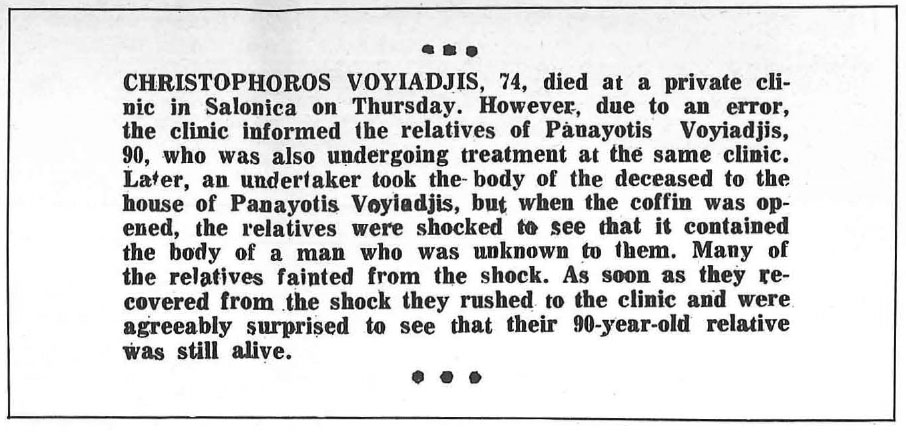
Next came the mayor looking throttled by his collar. (He owned a store and sold exclusively plastic souvenirs.) Then, all done up in purple and black and redolent of pomade, wearing flowing, Rasputinesque robes, the bishop emerged, with his dark sunglasses, his gold-topped black staff, and an enormous golden medallion. Behind him flapped three ecclesiastical sparrows. Brass mouthpieces were briefly brushed against the lips, and drumsticks were tested in the hands of the band, in anticipation of His appearance.
Out He came, proudly, the only one to smile. His white uniform fit Him like a saddle on a fence. At the sight of the majestic white hat festooned with gold braid, the spangling sunglasses, the epaulets with enough tassel for forty golden mops, the distinguishes crosses, the galaxy of stars — more than on all the world’s cognac bottles — the hoses, and nozzles, and ribbons galore, and medals punched into the white, starchy uniform, the band struck up, with fine gusto and air. Soon it settled into a sagging Sousa. The Regent walked like a cross between Trotsky and Marx — Groucho Marx.
As he stopped, the church bells crashed over our aching heads, and the tuba broke wind like a lonely brass elephant. Fine medals sparkled and jiggled on heaving chests, and the photographers clicked at the crazy glory. Then the explosion sang out. From the jetty, a smoke-ring was ejaculated and a missile burst through it and shot up into the morning air. Heads bent like grass in the wind. The concussion rocked about the harbour, then echoed incessantly in the stony hills and mountains.
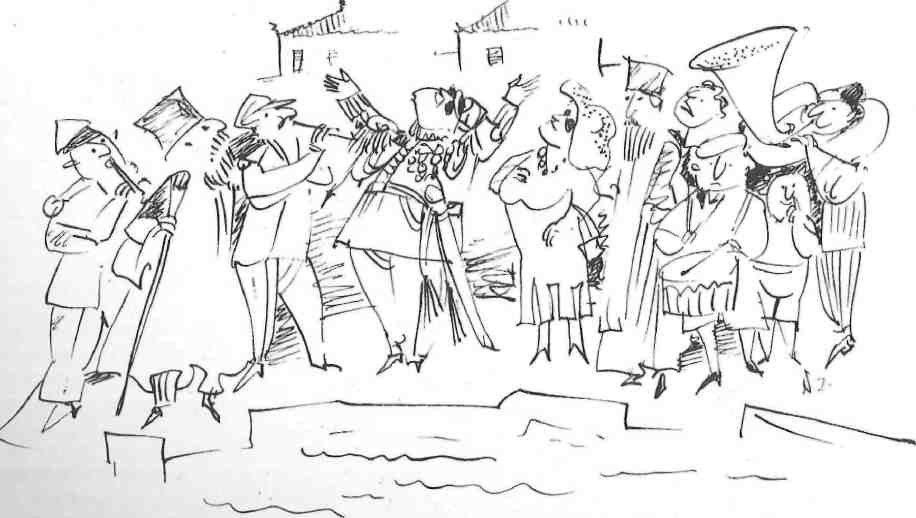
The parachute popped open sending a gasp through the townsfolk, as a banner dropped and unfurled below it, descending with a rhythmic, pendulum motion. There it was imprinted, the Emblem of the Revolution, the helmeted, rifled soldier, tall as a Trojan Horse, with the burning-red phoenix spreading its flaming wings behind him. The banner gently sank from a height of seven hundred feet. Mocking laughter and ironic applause rippled through the crowd, as they looked up at the Archangel of the Infantry. In his white uniform and sunglasses the Regent, the Day’s Celebrity, General Zoitakis, gazed proudly skywards with them.
As I watched the military phoenix descending, in all its splendor and aerial lunacy, from a cloudless blue sky, I could not stifle the desire to laugh. More and more each day the military leaders of the country were conforming to the absurdities usually found in the Greek News in Brief column — when they were not parodying the political antics of a third-rate Banana Republic. They were taking Elocution lessons from Franco and correspondence courses in Rhetoric and Economics via surface mail. The CIA may have taught its Cuban disciples how to wear wigs and voice alterators, but the colonels were altered in every human sense. And they surely knew how to lay their cornerstones! They laid enough to cobble a road to Abu Dhabi. Propaganda by parachute made us laugh but, in the end, there were not many laughs to be had.







